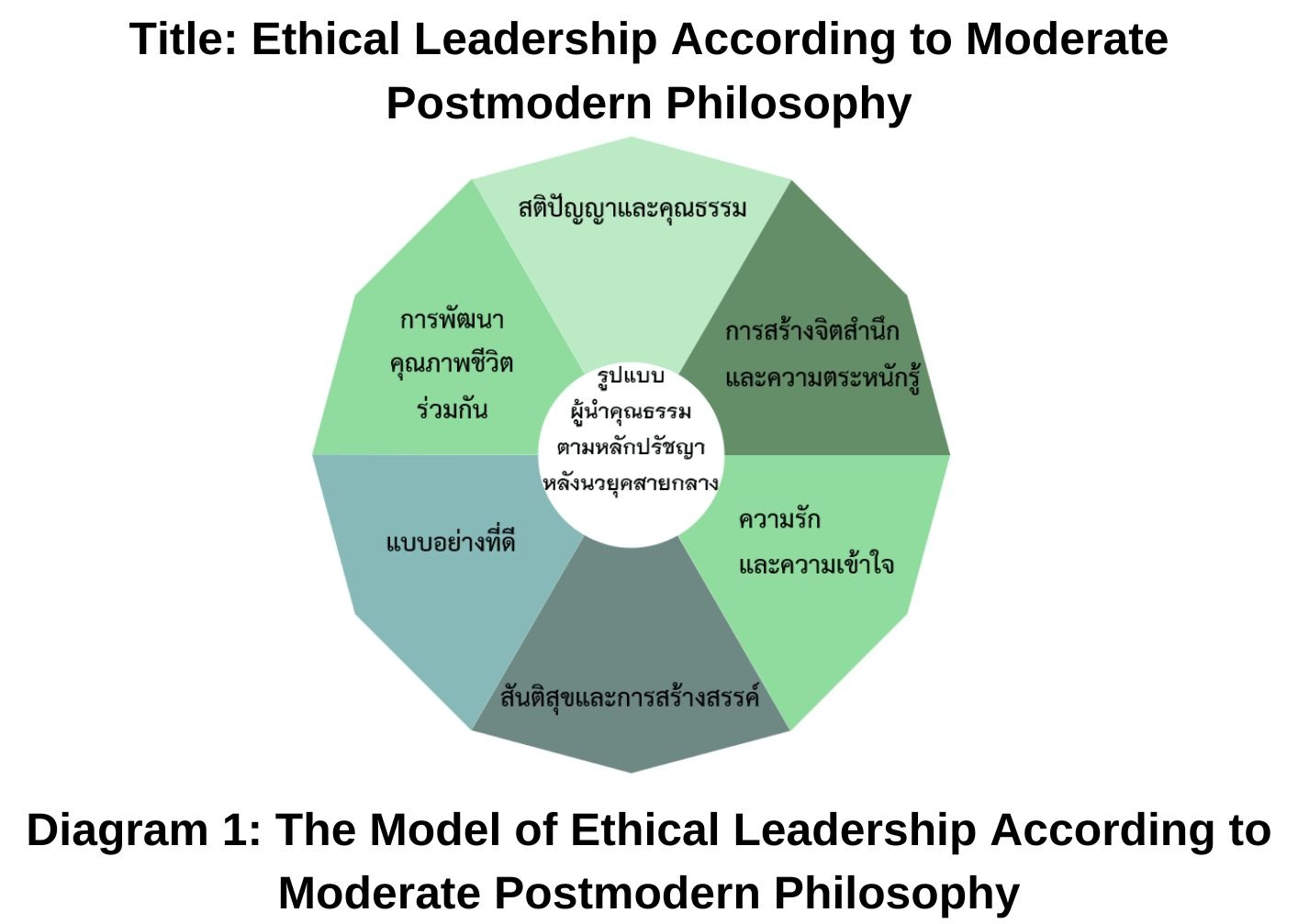Ethical Leadership According to Moderate Postmodern Philosophy
Keywords:
Leadership, Ethical, Moderate Postmodern PhilosophyAbstract
This research article is a qualitative study based on document analysis. Its objective is to analyze ethical leadership according to moderate postmodern philosophy. The findings reveal that moral leaders embody characteristics of charismatic leaders, spiritual leaders, servant leaders, and transformational leaders. They possess virtues and ethics that foster self-awareness and awareness in others, exhibit care and sharing, and apply critical thinking, which involves analysis and evaluation leading to decision-making. These leaders manage to achieve shared success within the organization and cultivate good relationships among people. They maintain an open-minded attitude, take a holistic view, and promote mutual support through love and understanding. They encourage participation, honor their colleagues, and respect human dignity. These leaders continuously self-manage to guide people toward the goal of happiness, which involves improving the quality of life for oneself and others through the powers of creativity, adaptivity, collaborativity, and requisitivity. They also clearly establish governance policies or corporate governance. The new knowledge generated from this research indicates that ethical leadership according to moderate postmodern philosophy, differ from conventional leaders who emphasize superior knowledge and abilities. Moral leaders are built on wisdom and virtue, fostering consciousness or awareness among individuals within the organization or the general public to cultivate love and unity. They connect people through love and understanding, prioritize peace, and exhibit creative initiative. They serve as role models in guiding individuals both mentally and behaviorally in the right direction-one that avoids harm and is characterized by compassion, sacrifice, sharing, and mutual support leading to peace and tranquility. Ultimately, they aim for the collective improvement of quality of life.
References
เพ็ญนภา ศรีแปลก. (2563). การศึกษาภาวะผู้นำของผู้บริหารสถานศึกษาขั้นพื้นฐาน สังกัดสำนักงาน. เขตพื้นที่การศึกษาประถมศึกษาสระแก้ว. วิทยานิพนธ์ครุศาสตรมหาบัณฑิต. บัณฑิตวิทยาลัย : มหาวิทยาลัยราชภัฏรําไพพรรณี.
มยุรี ศรีวงษ์ชัย และอำนวย ทองโปร่ง. (2566). ภาวะผู้นำเชิงอำนาจบารมีของผู้บริหารสถานศึกษาในโรงเรียนกลุ่มกรุงเทพตะวันออก สังกัดกรุงเทพมหานคร. วารสาร มจร อุบลปริทรรศน์, 8(1), 464-473.
มัณฑนา ชุมปัญญา. (2563). ภาวะผู้นำการเปลี่ยนแปลงของผู้บริหารที่ส่งผลต่อแรงจูงใจในการปฏิบัติงานของครูในโรงเรียน สังกัดสำนักงานเขตพื้นที่การศึกษาประถมศึกษาสกลนคร เขต 2. วิทยานิพนธ์ ค.ม. สกลนคร : มหาวิทยาลัยราชภัฏสกลนคร.
รัตติกรณ์ จงวิศาล. (2564). จิตวิทยาองค์กร. (พิมพ์ครั้งที่ 5). กรุงเทพฯ : บริษัท เอเชีย ดิจิตอล การพิมพ์ จำกัด.
ศิริธร พิมพ์ฝด. (2555). ภาวะผู้นำ.[ออนไลน์]. แหล่งที่มา : https://www.gotoknow.org/posts/320948 [5 มิถุนายน 2567]
ศิริวรรณ เสรีรัตน์ และคณะ. (2558). องค์การและการจัดการ. กรุงเทพฯ : ธรรมสาร.
สมเกียรติ ตังกิจวานิชย์ และคณะ. (2546). ปฏิรูปการศึกษาขั้นพื้นฐานเพื่อการเรียนรู้แห่งศตวรรษที่ 21. กรุงเทพฯ : สํานักงานสถิติแห่งชาติ.
สุวรรณ แสงดาว. (2559). คุณธรรม 9 ประการ.[ออนไลน์]. แหล่งที่มา : https://sites.google.com/site/suwanaccess/khu [5 มิถุนายน 2567]
อนันท์ งามสะอาด. (2561). ภาวะผู้นำเชิงคุณธรรม (Ethical leadership).[ออนไลน์]. แหล่งที่มา : https://www.facebook.com/TTECH.BDI/posts/1572049492881517/ [5 มิถุนายน 2567]
Burns, J. M. (1978). Leadership. New York : Harper & Row.
Fly LW, Matherly LL. (2006). Spiritual leadership as an integrating paradigm for positive leadership development. paper presented at the international Gallup leadership summit : Washington, DC.
Sergiovanni, T.J., and Moore, J.H. (1989). Schooling for tomorrow. Boston : Allyn & Bacon.
Yukl G. (2013). Leadership in Organizations (8th ed.). New Jersey : Pearson Education.
Yukl, G. (2010). Leadership in Organizations. (7th ed.). New Jersey : Prentice Hall.

Downloads
Published
How to Cite
Issue
Section
License
Copyright (c) 2024 Institute of Sufficiency Journal

This work is licensed under a Creative Commons Attribution-NonCommercial-NoDerivatives 4.0 International License.



